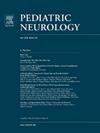Patient-Reported Outcomes in Childhood Moyamoya Arteriopathy
IF 2.1
3区 医学
Q2 CLINICAL NEUROLOGY
引用次数: 0
Abstract
Background
Little is known about quality of life, sleep, and mental health in children with moyamoya arteriopathy (MMA). A better understanding of patient-reported outcomes may lead to improved treatment.
Methods
Patients with MMA <26 years old and their caretakers completed validated, age-appropriate questionnaires including the Pediatric Quality of Life (PedsQL) Inventory and Patient-Reported Outcomes Measurement Information System (PROMIS) measuring health-related quality of life, sleep, anxiety, depression, and overall health.
Results
All 21 caretaker-proxies and eight of 21 patients with MMA completed questionnaires. Median age of participants with MMA was 7.8 years. The MMA cohort included 10 children with moyamoya disease and 11 with moyamoya syndrome, and 11 participants (52.4%) had a prior clinical stroke. Nine siblings unaffected by moyamoya and 20 participants with perinatal stroke were enrolled as comparator groups. Participants with MMA had greater impairment in school/work quality of life compared with normative values on caretaker and child-reported PedsQL surveys (85.5 vs 62.3 [P < 0.001] and 78.6 vs 51.2 [P = 0.017], respectively). Participants with MMA did not have significantly different physical impairment compared with normative values and siblings on caretaker and child-reported surveys. Caretaker-proxy PROMIS scores revealed high rates of moderate-severe anxiety (57.1% vs 25%, P < 0.001), sleep impairment (47.6% vs 25%, P = 0.017), and fair-poor global health (76.2% vs 25%, P < 0.001) in participants with MMA compared with the general population.
Conclusions
Patients with MMA have high rates of school/work impairment, anxiety, sleep impairment, and fair-poor global health. Screening for patient-reported outcomes, even in the absence of stroke or physical impairment, may improve treatment.
儿童莫亚莫亚动脉硬化症的患者报告结果。
背景:人们对莫亚莫亚动脉病变(MMA)患儿的生活质量、睡眠和心理健康知之甚少。更好地了解患者报告的结果可能有助于改善治疗:方法:MMA 患者:所有 21 位看护人-代理人和 21 位 MMA 患者中的 8 位都填写了调查问卷。MMA患者的中位年龄为7.8岁。MMA 患者队列中包括 10 名患 moyamoya 病的儿童和 11 名患 moyamoya 综合征的儿童,其中 11 名患者(52.4%)曾发生过临床中风。9 名未受 moyamoya 影响的兄弟姐妹和 20 名患有围产期中风的患者被纳入对比组。在照顾者和儿童报告的 PedsQL 调查中,与正常值相比,MMA 患者的学校/工作生活质量受损程度更高(85.5 vs 62.3 [P 结论:MMA 患者的学校/工作生活质量受损程度更高,而正常值为 62.3 [P 结论:MMA 患者的学校/工作生活质量受损程度更高:马氏综合征患者的学习/工作质量受损、焦虑、睡眠质量受损的比例较高,总体健康状况一般-较差。对患者报告的结果进行筛查,即使没有中风或身体损伤,也可改善治疗效果。
本文章由计算机程序翻译,如有差异,请以英文原文为准。
求助全文
约1分钟内获得全文
求助全文
来源期刊

Pediatric neurology
医学-临床神经学
CiteScore
4.80
自引率
2.60%
发文量
176
审稿时长
78 days
期刊介绍:
Pediatric Neurology publishes timely peer-reviewed clinical and research articles covering all aspects of the developing nervous system.
Pediatric Neurology features up-to-the-minute publication of the latest advances in the diagnosis, management, and treatment of pediatric neurologic disorders. The journal''s editor, E. Steve Roach, in conjunction with the team of Associate Editors, heads an internationally recognized editorial board, ensuring the most authoritative and extensive coverage of the field. Among the topics covered are: epilepsy, mitochondrial diseases, congenital malformations, chromosomopathies, peripheral neuropathies, perinatal and childhood stroke, cerebral palsy, as well as other diseases affecting the developing nervous system.
 求助内容:
求助内容: 应助结果提醒方式:
应助结果提醒方式:


